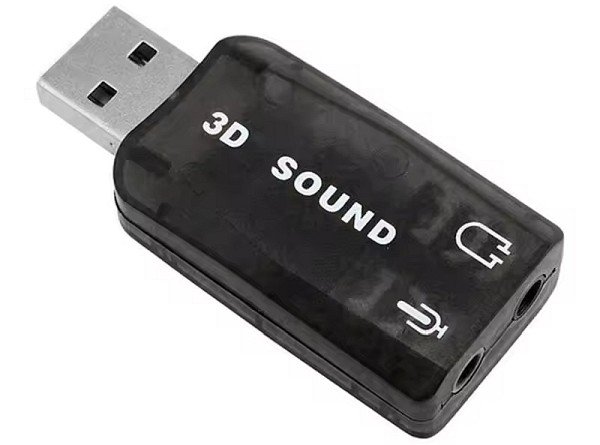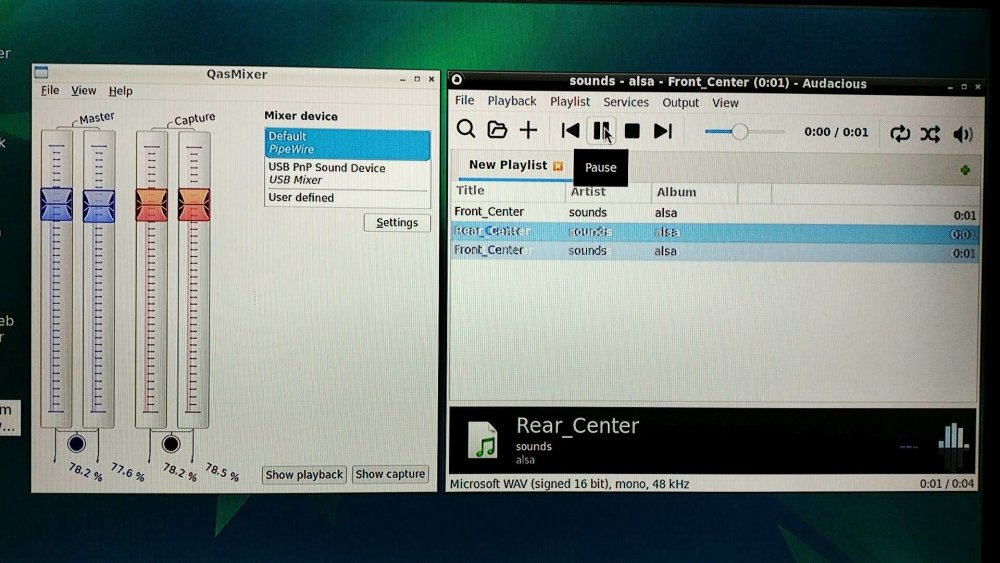All Activity
- Past hour
-
Sorry - this is probably an easy one for those that know. But I am trying hard to copy my work and progress and build another NAS out of another T95z Plus box for my brother. All is going well - but on the second box - months after building the first - I installed the latest download. So I have Old box = Armbian Linux 6.12.32-current-meson64 - v25.5.1 New box = Armbian Linux 6.12.34-current-meson64 - v25.8 rolling - Support:for advanced users (rolling release) Both show - Ubuntu stable (noble) - which I think I changed on first boot with Armbian-config. Okay - so I don't think I am an advanced user so that warning has got me worried. So is there another version I should be using? I can't find the old file I downloaded so they would be identical. I have disabled unattended upgrades and things like that. Or am I worrying about nothing. Anyway - thanks as always. I still can't believe I have these cheap things pulled from my dust bin doing a real job again.
-
TV Box Name: Sunvell T95Z plus Octagon shaped box (I wrote it before – but Beware – apparently a lot of variants) CPU Amlogics S912 Armbian build file name: Armbian_community_25.8.0-trunk.277_Aml-s9xx-box_noble_current_6.12.34 DTB file used: meson-gxm-t95z-plus.dtb – (my other T95z uses meson-gxm-vega-s96.dtb) Kernel Version: 6.12.34 Distribution Installed (focal, buster, etc): Noble Working Ethernet (Yes/No): Yes Max Ethernet Speed that works (100/1000): Not sure how to determine... Does wifi work (Yes/No): No Does bluetooth work (Yes/No): Not tested Does HDMI audio work (Yes/No): Yes Additional Comments (provide any additional information you feel is important): This is my second T95z plus box build. Using as headless server and both seem solid. Confirming what others have said – the build is different inside. This has a different wifi card and eemc. I have a 3rd T95z plus that has the dreaded NAND chip too. Having fun and learning. Using as a simple NAS now with a ZFS pool and works just fine.
-
My Radxa Rock 4SE does not boot since community-build 25.8.0-trunk.228. Current local builds based on the "main" branch are also affected. The bootloader log gives the following error: Checking hash(es) for config config-1 ... OK Checking hash(es) for Image atf-1 ... sha256+ OK Checking hash(es) for Image u-boot ... sha256+ OK Checking hash(es) for Image fdt-1 ... sha256+ OK Checking hash(es) for Image atf-2 ... sha256+ OK Checking hash(es) for Image atf-3 ... sha256+ OK ERROR: not expected type found -4001165690437497392 This source suggests, that it might be a problem with the ATF. However, my knowledge about details of the boot process are unforunately not sufficient to find a solution to this problem. How to reproduce? Download https://github.com/armbian/community/releases/download/25.8.0-trunk.228/Armbian_community_25.8.0-trunk.228_Rock-4se_bookworm_current_6.12.33_minimal.img.xz Install on SD card Try to boot Rock 4 SE from SD card image
- Today
-
Welcome to custom hardware / division exotics / subdivision retro It is hard already when its new custom hardware and main division. If nobody ported HW to mainline Linux and keep it operational, its usually quite a long path. Armbian provides build framework, that helps in the process, but hard work is still on the one that will deal with the SoC - here you can hope to find someone on forum(s) to share some specific ideas. Adding is fairly straightforward https://docs.armbian.com/Process_Contribute/#adding-a-new-board but if there are sources for boot loader, sources for kernel, or better - support in the mainline kernel. Even when you have all this, it can still be quite challenging. Each such board usually require more people, a team. When I recall how many months we lost on one of Marvell's 🤔 Espressobin is an example how board support can be made super complicated - check history from day one. If board support package is on that level ... its worse out of all we have seen here. And now its an old hardware, not interesting so much. And remain broken as we don't have anyone to deal with it / its not worth.
-
So my experience with Armbian is pretty broad, starting with Raspberry PI, then taking a hard left turn at Albuquerque with me successfully running a docker server on an Allwinner H3 based T95 super TV box. I’ve also run it on SBCs like the yeayeetoo Rockchip series. I’ve just never compiled a build and it is so hard to find any info from anywhere about the Armada 1500 running anything. What is the virtual system option?
-

We are ready to offer a Bountysource donation to Armbian
amazingfate replied to maximumsettings's topic in Orange Pi 5
These errors are fine because moonlight will try all the hw accel APIs like vaapi, vdpau and vulkan, but on rockchip platform we only need rkmpp decoder, as you can see in the log it is detected, - Yesterday
-

We are ready to offer a Bountysource donation to Armbian
tanod replied to maximumsettings's topic in Orange Pi 5
Hey @amazingfate, Thank you very much for the reply! I managed to build it but still a lot of errors in the log... #moonlight-qt/app/moonlight 00:00:00 - SDL Info (0): Compiled with SDL 2.30.0 00:00:00 - SDL Info (0): Running with SDL 2.30.0 00:00:00 - Qt Info: No translation available for "bg_BG" 00:00:00 - SDL Info (0): Detected Wayland 00:00:00 - Qt Warning: qrc:/gui/main.qml:13:1: QML ApplicationWindow: ToolTip must be attached to an Item 00:00:00 - Qt Info: Found "gamecontrollerdb.txt" at "/home/noone/.cache/Moonlight Game Streaming Project/Moonlight/gamecontrollerdb.txt" 00:00:00 - SDL Info (0): Loaded 335 new gamepad mappings Couldn't open plugin directory: No such file or directory No plugins found, falling back on no decorations 00:00:00 - SDL Warn (0): Failed to create test window with platform flags: Installed Vulkan doesn't implement the VK_KHR_surface extension 00:00:00 - SDL Info (0): V-sync disabled libva info: VA-API version 1.20.0 libva info: Trying to open /usr/lib/aarch64-linux-gnu/dri/rockchip_drv_video.so libva info: va_openDriver() returns -1 00:00:00 - SDL Info (0): Skipping VAAPI fallback driver names on libva 2.20+ 00:00:00 - SDL Error (0): Failed to initialize VAAPI: -1 libva info: VA-API version 1.20.0 libva info: Trying to open /usr/lib/aarch64-linux-gnu/dri/rockchip_drv_video.so libva info: va_openDriver() returns -1 00:00:00 - SDL Info (0): Skipping VAAPI fallback driver names on libva 2.20+ 00:00:00 - SDL Error (0): Failed to initialize VAAPI: -1 00:00:00 - SDL Error (0): SDL_Vulkan_GetInstanceExtensions() #1 failed: The specified window isn't a Vulkan window 00:00:00 - SDL Error (0): SDL_Vulkan_GetInstanceExtensions() #1 failed: The specified window isn't a Vulkan window 00:00:00 - SDL Info (0): Opened DRM render node: /dev/dri/renderD128 00:00:00 - SDL Info (0): GPU driver: rockchip 00:00:00 - SDL Info (0): Direct rendering via DRM is disabled 00:00:00 - SDL Error (0): SDL_Vulkan_GetInstanceExtensions() #1 failed: The specified window isn't a Vulkan window 00:00:00 - SDL Info (0): DRM backend supports exporting EGLImage 00:00:00 - SDL Info (0): EGLRenderer: EGL doesn't support HDR rendering 00:00:00 - SDL Info (0): Opened DRM render node: /dev/dri/renderD128 00:00:00 - SDL Info (0): GPU driver: rockchip 00:00:00 - SDL Info (0): Direct rendering via DRM is disabled 00:00:00 - SDL Error (0): SDL_Vulkan_GetInstanceExtensions() #1 failed: The specified window isn't a Vulkan window 00:00:00 - SDL Info (0): Trying DrmRenderer for codec hevc_rkmpp due to preferred pixel format: 0xb3 00:00:00 - SDL Info (0): Opened DRM render node: /dev/dri/renderD128 00:00:00 - SDL Info (0): GPU driver: rockchip 00:00:00 - SDL Info (0): Direct rendering via DRM is disabled 00:00:00 - SDL Error (0): SDL_Vulkan_GetInstanceExtensions() #1 failed: The specified window isn't a Vulkan window 00:00:00 - SDL Info (0): DRM backend supports exporting EGLImage 00:00:00 - SDL Info (0): EGLRenderer: EGL doesn't support HDR rendering 00:00:00 - SDL Info (0): Opened DRM render node: /dev/dri/renderD128 00:00:00 - SDL Info (0): GPU driver: rockchip 00:00:00 - SDL Info (0): Direct rendering via DRM is disabled 00:00:00 - SDL Info (0): Trying SdlRenderer for codec hevc_rkmpp due to compatible pixel format: 0xe4 00:00:00 - SDL Warn (0): No renderer can handle output from decoder: hevc_rkmpp 00:00:00 - SDL Info (0): Trying SdlRenderer for codec hevc_cuvid due to preferred pixel format: 0x9f 00:00:00 - SDL Info (0): Trying DrmRenderer for codec hevc_cuvid due to compatible pixel format: 0x9f 00:00:00 - SDL Info (0): Opened DRM render node: /dev/dri/renderD128 00:00:00 - SDL Info (0): GPU driver: rockchip 00:00:00 - SDL Info (0): Direct rendering via DRM is disabled 00:00:00 - SDL Error (0): SDL_Vulkan_GetInstanceExtensions() #1 failed: The specified window isn't a Vulkan window 00:00:00 - SDL Info (0): DRM backend supports exporting EGLImage 00:00:00 - SDL Info (0): EGLRenderer: EGL doesn't support HDR rendering 00:00:00 - SDL Info (0): Opened DRM render node: /dev/dri/renderD128 00:00:00 - SDL Info (0): GPU driver: rockchip 00:00:00 - SDL Info (0): Direct rendering via DRM is disabled 00:00:00 - SDL Info (0): Trying PlVkRenderer for codec hevc_cuvid due to compatible pixel format: 0x9f 00:00:00 - SDL Error (0): SDL_Vulkan_GetInstanceExtensions() #1 failed: The specified window isn't a Vulkan window 00:00:00 - SDL Error (0): SDL_Vulkan_GetInstanceExtensions() #1 failed: The specified window isn't a Vulkan window 00:00:00 - SDL Warn (0): No renderer can handle output from decoder: hevc_cuvid 00:00:00 - SDL Info (0): Opened DRM render node: /dev/dri/renderD128 00:00:00 - SDL Info (0): GPU driver: rockchip 00:00:00 - SDL Info (0): Direct rendering via DRM is disabled 00:00:00 - SDL Error (0): SDL_Vulkan_GetInstanceExtensions() #1 failed: The specified window isn't a Vulkan window 00:00:00 - SDL Info (0): DRM backend supports exporting EGLImage 00:00:00 - SDL Info (0): EGLRenderer: EGL doesn't support HDR rendering 00:00:00 - SDL Info (0): Opened DRM render node: /dev/dri/renderD128 00:00:00 - SDL Info (0): GPU driver: rockchip 00:00:00 - SDL Info (0): Direct rendering via DRM is disabled 00:00:00 - SDL Error (0): SDL_Vulkan_GetInstanceExtensions() #1 failed: The specified window isn't a Vulkan window 00:00:00 - SDL Info (0): Trying DrmRenderer for codec hevc_rkmpp due to preferred pixel format: 0xb3 00:00:00 - SDL Info (0): Opened DRM render node: /dev/dri/renderD128 00:00:00 - SDL Info (0): GPU driver: rockchip 00:00:00 - SDL Info (0): Direct rendering via DRM is disabled 00:00:00 - SDL Error (0): SDL_Vulkan_GetInstanceExtensions() #1 failed: The specified window isn't a Vulkan window 00:00:00 - SDL Info (0): DRM backend supports exporting EGLImage 00:00:00 - SDL Info (0): EGLRenderer: EGL doesn't support HDR rendering 00:00:00 - SDL Info (0): Opened DRM render node: /dev/dri/renderD128 00:00:00 - SDL Info (0): GPU driver: rockchip 00:00:00 - SDL Info (0): Direct rendering via DRM is disabled 00:00:00 - SDL Info (0): Trying SdlRenderer for codec hevc_rkmpp due to compatible pixel format: 0xe4 00:00:00 - SDL Warn (0): No renderer can handle output from decoder: hevc_rkmpp 00:00:00 - SDL Error (0): SDL_Vulkan_GetInstanceExtensions() #1 failed: The specified window isn't a Vulkan window 00:00:00 - SDL Error (0): SDL_Vulkan_GetInstanceExtensions() #1 failed: The specified window isn't a Vulkan window 00:00:00 - SDL Info (0): Trying SdlRenderer for codec hevc_cuvid due to preferred pixel format: 0x9f 00:00:00 - SDL Info (0): Trying DrmRenderer for codec hevc_cuvid due to compatible pixel format: 0x9f 00:00:00 - SDL Info (0): Opened DRM render node: /dev/dri/renderD128 00:00:00 - SDL Info (0): GPU driver: rockchip 00:00:00 - SDL Info (0): Direct rendering via DRM is disabled 00:00:00 - SDL Error (0): SDL_Vulkan_GetInstanceExtensions() #1 failed: The specified window isn't a Vulkan window 00:00:00 - SDL Info (0): DRM backend supports exporting EGLImage 00:00:00 - SDL Info (0): EGLRenderer: EGL doesn't support HDR rendering 00:00:00 - SDL Info (0): Opened DRM render node: /dev/dri/renderD128 00:00:00 - SDL Info (0): GPU driver: rockchip 00:00:00 - SDL Info (0): Direct rendering via DRM is disabled 00:00:00 - SDL Info (0): Trying PlVkRenderer for codec hevc_cuvid due to compatible pixel format: 0x9f 00:00:00 - SDL Error (0): SDL_Vulkan_GetInstanceExtensions() #1 failed: The specified window isn't a Vulkan window 00:00:00 - SDL Error (0): SDL_Vulkan_GetInstanceExtensions() #1 failed: The specified window isn't a Vulkan window 00:00:00 - SDL Warn (0): No renderer can handle output from decoder: hevc_cuvid libva info: VA-API version 1.20.0 libva info: Trying to open /usr/lib/aarch64-linux-gnu/dri/rockchip_drv_video.so libva info: va_openDriver() returns -1 00:00:00 - SDL Info (0): Skipping VAAPI fallback driver names on libva 2.20+ 00:00:00 - SDL Error (0): Failed to initialize VAAPI: -1 libva info: VA-API version 1.20.0 libva info: Trying to open /usr/lib/aarch64-linux-gnu/dri/rockchip_drv_video.so libva info: va_openDriver() returns -1 00:00:00 - SDL Info (0): Skipping VAAPI fallback driver names on libva 2.20+ 00:00:00 - SDL Error (0): Failed to initialize VAAPI: -1 00:00:00 - SDL Warn (0): VDPAU is not supported on Wayland 00:00:00 - SDL Warn (0): VDPAU is not supported on Wayland 00:00:00 - SDL Error (0): Unable to find working decoder for format: 200 00:00:00 - SDL Error (0): Unable to load FFmpeg decoder 00:00:00 - SDL Info (0): V-sync disabled libva info: VA-API version 1.20.0 libva info: Trying to open /usr/lib/aarch64-linux-gnu/dri/rockchip_drv_video.so libva info: va_openDriver() returns -1 00:00:00 - SDL Info (0): Skipping VAAPI fallback driver names on libva 2.20+ 00:00:00 - SDL Error (0): Failed to initialize VAAPI: -1 libva info: VA-API version 1.20.0 libva info: Trying to open /usr/lib/aarch64-linux-gnu/dri/rockchip_drv_video.so libva info: va_openDriver() returns -1 00:00:00 - SDL Info (0): Skipping VAAPI fallback driver names on libva 2.20+ 00:00:00 - SDL Error (0): Failed to initialize VAAPI: -1 00:00:00 - SDL Error (0): SDL_Vulkan_GetInstanceExtensions() #1 failed: The specified window isn't a Vulkan window 00:00:00 - SDL Error (0): SDL_Vulkan_GetInstanceExtensions() #1 failed: The specified window isn't a Vulkan window 00:00:00 - SDL Info (0): Trying SdlRenderer for codec av1_cuvid due to preferred pixel format: 0x9f 00:00:00 - SDL Info (0): Trying DrmRenderer for codec av1_cuvid due to compatible pixel format: 0x9f 00:00:00 - SDL Info (0): Opened DRM render node: /dev/dri/renderD128 00:00:00 - SDL Info (0): GPU driver: rockchip 00:00:00 - SDL Info (0): Direct rendering via DRM is disabled 00:00:00 - SDL Error (0): SDL_Vulkan_GetInstanceExtensions() #1 failed: The specified window isn't a Vulkan window 00:00:00 - SDL Info (0): DRM backend supports exporting EGLImage 00:00:00 - SDL Info (0): EGLRenderer: EGL doesn't support HDR rendering 00:00:00 - SDL Info (0): Opened DRM render node: /dev/dri/renderD128 00:00:00 - SDL Info (0): GPU driver: rockchip 00:00:00 - SDL Info (0): Direct rendering via DRM is disabled 00:00:00 - SDL Info (0): Trying PlVkRenderer for codec av1_cuvid due to compatible pixel format: 0x9f 00:00:00 - SDL Error (0): SDL_Vulkan_GetInstanceExtensions() #1 failed: The specified window isn't a Vulkan window 00:00:00 - SDL Error (0): SDL_Vulkan_GetInstanceExtensions() #1 failed: The specified window isn't a Vulkan window 00:00:00 - SDL Warn (0): No renderer can handle output from decoder: av1_cuvid 00:00:00 - SDL Info (0): Opened DRM render node: /dev/dri/renderD128 00:00:00 - SDL Info (0): GPU driver: rockchip 00:00:00 - SDL Info (0): Direct rendering via DRM is disabled 00:00:00 - SDL Error (0): SDL_Vulkan_GetInstanceExtensions() #1 failed: The specified window isn't a Vulkan window 00:00:00 - SDL Info (0): DRM backend supports exporting EGLImage 00:00:00 - SDL Info (0): EGLRenderer: EGL doesn't support HDR rendering 00:00:00 - SDL Info (0): Opened DRM render node: /dev/dri/renderD128 00:00:00 - SDL Info (0): GPU driver: rockchip 00:00:00 - SDL Info (0): Direct rendering via DRM is disabled 00:00:00 - SDL Error (0): SDL_Vulkan_GetInstanceExtensions() #1 failed: The specified window isn't a Vulkan window 00:00:00 - SDL Info (0): Trying DrmRenderer for codec av1_rkmpp due to preferred pixel format: 0xb3 00:00:00 - SDL Info (0): Opened DRM render node: /dev/dri/renderD128 00:00:00 - SDL Info (0): GPU driver: rockchip 00:00:00 - SDL Info (0): Direct rendering via DRM is disabled 00:00:00 - SDL Error (0): SDL_Vulkan_GetInstanceExtensions() #1 failed: The specified window isn't a Vulkan window 00:00:00 - SDL Info (0): DRM backend supports exporting EGLImage 00:00:00 - SDL Info (0): EGLRenderer: EGL doesn't support HDR rendering 00:00:00 - SDL Info (0): Opened DRM render node: /dev/dri/renderD128 00:00:00 - SDL Info (0): GPU driver: rockchip 00:00:00 - SDL Info (0): Direct rendering via DRM is disabled 00:00:00 - SDL Info (0): Trying SdlRenderer for codec av1_rkmpp due to compatible pixel format: 0xe4 00:00:00 - SDL Warn (0): No renderer can handle output from decoder: av1_rkmpp 00:00:00 - SDL Info (0): Trying SdlRenderer for codec av1_cuvid due to preferred pixel format: 0x9f 00:00:00 - SDL Info (0): Trying DrmRenderer for codec av1_cuvid due to compatible pixel format: 0x9f 00:00:00 - SDL Info (0): Opened DRM render node: /dev/dri/renderD128 00:00:00 - SDL Info (0): GPU driver: rockchip 00:00:00 - SDL Info (0): Direct rendering via DRM is disabled 00:00:00 - SDL Error (0): SDL_Vulkan_GetInstanceExtensions() #1 failed: The specified window isn't a Vulkan window 00:00:00 - SDL Info (0): DRM backend supports exporting EGLImage 00:00:00 - SDL Info (0): EGLRenderer: EGL doesn't support HDR rendering 00:00:00 - SDL Info (0): Opened DRM render node: /dev/dri/renderD128 00:00:00 - SDL Info (0): GPU driver: rockchip 00:00:00 - SDL Info (0): Direct rendering via DRM is disabled 00:00:00 - SDL Info (0): Trying PlVkRenderer for codec av1_cuvid due to compatible pixel format: 0x9f 00:00:00 - SDL Error (0): SDL_Vulkan_GetInstanceExtensions() #1 failed: The specified window isn't a Vulkan window 00:00:00 - SDL Error (0): SDL_Vulkan_GetInstanceExtensions() #1 failed: The specified window isn't a Vulkan window 00:00:00 - SDL Warn (0): No renderer can handle output from decoder: av1_cuvid 00:00:00 - SDL Info (0): Opened DRM render node: /dev/dri/renderD128 00:00:00 - SDL Info (0): GPU driver: rockchip 00:00:00 - SDL Info (0): Direct rendering via DRM is disabled 00:00:00 - SDL Error (0): SDL_Vulkan_GetInstanceExtensions() #1 failed: The specified window isn't a Vulkan window 00:00:00 - SDL Info (0): DRM backend supports exporting EGLImage 00:00:00 - SDL Info (0): EGLRenderer: EGL doesn't support HDR rendering 00:00:00 - SDL Info (0): Opened DRM render node: /dev/dri/renderD128 00:00:00 - SDL Info (0): GPU driver: rockchip 00:00:00 - SDL Info (0): Direct rendering via DRM is disabled 00:00:00 - SDL Error (0): SDL_Vulkan_GetInstanceExtensions() #1 failed: The specified window isn't a Vulkan window 00:00:00 - SDL Info (0): Trying DrmRenderer for codec av1_rkmpp due to preferred pixel format: 0xb3 00:00:00 - SDL Info (0): Opened DRM render node: /dev/dri/renderD128 00:00:00 - SDL Info (0): GPU driver: rockchip 00:00:00 - SDL Info (0): Direct rendering via DRM is disabled 00:00:00 - SDL Error (0): SDL_Vulkan_GetInstanceExtensions() #1 failed: The specified window isn't a Vulkan window 00:00:00 - SDL Info (0): DRM backend supports exporting EGLImage 00:00:00 - SDL Info (0): EGLRenderer: EGL doesn't support HDR rendering 00:00:00 - SDL Info (0): Opened DRM render node: /dev/dri/renderD128 00:00:00 - SDL Info (0): GPU driver: rockchip 00:00:00 - SDL Info (0): Direct rendering via DRM is disabled 00:00:00 - SDL Info (0): Trying SdlRenderer for codec av1_rkmpp due to compatible pixel format: 0xe4 00:00:00 - SDL Warn (0): No renderer can handle output from decoder: av1_rkmpp libva info: VA-API version 1.20.0 libva info: Trying to open /usr/lib/aarch64-linux-gnu/dri/rockchip_drv_video.so libva info: va_openDriver() returns -1 00:00:00 - SDL Info (0): Skipping VAAPI fallback driver names on libva 2.20+ 00:00:00 - SDL Error (0): Failed to initialize VAAPI: -1 libva info: VA-API version 1.20.0 libva info: Trying to open /usr/lib/aarch64-linux-gnu/dri/rockchip_drv_video.so libva info: va_openDriver() returns -1 00:00:00 - SDL Info (0): Skipping VAAPI fallback driver names on libva 2.20+ 00:00:00 - SDL Error (0): Failed to initialize VAAPI: -1 00:00:00 - SDL Warn (0): VDPAU is not supported on Wayland 00:00:00 - SDL Warn (0): VDPAU is not supported on Wayland 00:00:00 - SDL Error (0): Unable to find working decoder for format: 2000 00:00:00 - SDL Error (0): Unable to load FFmpeg decoder 00:00:00 - SDL Info (0): V-sync disabled 00:00:00 - SDL Error (0): SDL_Vulkan_GetInstanceExtensions() #1 failed: The specified window isn't a Vulkan window 00:00:00 - SDL Error (0): SDL_Vulkan_GetInstanceExtensions() #1 failed: The specified window isn't a Vulkan window 00:00:00 - SDL Error (0): Unable to find working decoder for format: 200 00:00:00 - SDL Error (0): Unable to load FFmpeg decoder 00:00:00 - SDL Info (0): V-sync disabled 00:00:00 - SDL Error (0): SDL_Vulkan_GetInstanceExtensions() #1 failed: The specified window isn't a Vulkan window 00:00:00 - SDL Error (0): SDL_Vulkan_GetInstanceExtensions() #1 failed: The specified window isn't a Vulkan window 00:00:00 - SDL Error (0): SDL_Vulkan_GetInstanceExtensions() #1 failed: The specified window isn't a Vulkan window 00:00:00 - SDL Error (0): SDL_Vulkan_GetInstanceExtensions() #1 failed: The specified window isn't a Vulkan window 00:00:00 - SDL Error (0): SDL_Vulkan_GetInstanceExtensions() #1 failed: The specified window isn't a Vulkan window 00:00:00 - SDL Error (0): SDL_Vulkan_GetInstanceExtensions() #1 failed: The specified window isn't a Vulkan window 00:00:00 - SDL Error (0): Unable to find working decoder for format: 2000 00:00:00 - SDL Error (0): Unable to load FFmpeg decoder 00:00:00 - SDL Info (0): V-sync disabled libva info: VA-API version 1.20.0 libva info: Trying to open /usr/lib/aarch64-linux-gnu/dri/rockchip_drv_video.so libva info: va_openDriver() returns -1 00:00:00 - SDL Info (0): Skipping VAAPI fallback driver names on libva 2.20+ 00:00:00 - SDL Error (0): Failed to initialize VAAPI: -1 libva info: VA-API version 1.20.0 libva info: Trying to open /usr/lib/aarch64-linux-gnu/dri/rockchip_drv_video.so libva info: va_openDriver() returns -1 00:00:00 - SDL Info (0): Skipping VAAPI fallback driver names on libva 2.20+ 00:00:00 - SDL Error (0): Failed to initialize VAAPI: -1 00:00:00 - SDL Warn (0): VDPAU is not supported on Wayland 00:00:00 - SDL Warn (0): VDPAU is not supported on Wayland 00:00:00 - SDL Error (0): SDL_Vulkan_GetInstanceExtensions() #1 failed: The specified window isn't a Vulkan window 00:00:00 - SDL Error (0): SDL_Vulkan_GetInstanceExtensions() #1 failed: The specified window isn't a Vulkan window 00:00:00 - SDL Info (0): Opened DRM render node: /dev/dri/renderD128 00:00:00 - SDL Info (0): GPU driver: rockchip 00:00:00 - SDL Info (0): Direct rendering via DRM is disabled 00:00:00 - SDL Info (0): DRM backend supports exporting EGLImage 00:00:00 - SDL Info (0): Color buffer is: R8G8B8A0 00:00:00 - SDL Info (0): EGL passed preflight checks. Using EGL for GL context creation. 00:00:00 - SDL Info (0): Using DRM renderer 00:00:00 - FFmpeg: [hevc_mp4toannexb @ 0xffff80cc7f80] The input looks like it is Annex B already 00:00:00 - FFmpeg: [hevc_rkmpp @ 0xffff80cc84f0] Picked up an existing RKMPP hardware device 00:00:00 - FFmpeg: [hevc_rkmpp @ 0xffff80cc84f0] Wrote 335 bytes to decoder 00:00:00 - FFmpeg: [hevc_rkmpp @ 0xffff80cc84f0] Wrote 335 bytes to decoder 00:00:00 - FFmpeg: [hevc_rkmpp @ 0xffff80cc84f0] Noticed an info change 00:00:00 - FFmpeg: [hevc_rkmpp @ 0xffff80cc84f0] Decoder options: deint=true afbc=0 fast_parse=true buf_mode=0 00:00:00 - FFmpeg: [hevc_rkmpp @ 0xffff80cc84f0] Configured with size: 1280x720 | pix_fmt: drm_prime | sw_pix_fmt: nv12 00:00:00 - FFmpeg: [hevc_rkmpp @ 0xffff80cc84f0] Wrote 335 bytes to decoder 00:00:00 - FFmpeg: [hevc_rkmpp @ 0xffff80cc84f0] Received a frame 00:00:00 - SDL Info (0): FFmpeg-based video decoder chosen 00:00:00 - Qt Info: Found "gamecontrollerdb.txt" at "/home/noone/.cache/Moonlight Game Streaming Project/Moonlight/gamecontrollerdb.txt" 00:00:00 - SDL Info (0): Loaded 335 new gamepad mappings 00:00:00 - Qt Debug: Current Moonlight version: "6.1.0" 00:00:01 - Qt Info: Gamepad mappings are up to date 00:00:01 - Qt Info: Latest supported GFE server: "99.99.99.99" Is it going to be able to render 4K over 1G network, with this setup? Regards, Tano -
sudo modprobe i2c-dev ?
-
Feature regressions are expected - Linux kernel is complicated machinery and without spending hours, a day or a week investigating, it's usually not possible to tell. We don't touch Rpi kernels much. We have our own kernel config, but we use official Rpi sources, so I guess 1st step would be looking if someone reported something similar https://github.com/raspberrypi/linux/issues By newer you mean 6.12.y, 6.16.y ... or 6.6.63 ->
-
It appears that Heiko is the maintainer for RPi boards (all varieties?) in Armbian, but I believe @Igor also has the device and maybe he can repond. I suggest you try to talk to Heiko and see if he has something to say. I just perused the git sources and you might want to talk to Pander as well.
-
Brace yourself, this is going to take a long time, most likely months to years and most likely you will never get this to run. That being said, to get yourself started, you probably ought to start compiling stuff and getting yourself familiar around the armbian build framework. Do you have another SBC that is supported by Armbian? If not, it's probably best to target one of the virtual system options. I wish the documentation for this stuff was better. As of now, it is scattered throughout.
-

Orangepi Zero 2W wrong color display on MPI3501
robertoj replied to Minh Tiến Nguyễn's topic in Allwinner sunxi
Can you confirm that you can still run X11 with Linux 6.12? -

Sound works but only with certain versions
Reluctant Linux User replied to Reluctant Linux User's topic in Radxa Rock 5 ITX
Ok, the noble_vendor_gnome image actually works. Not out of the box, you have to select "headphones" and most important, the gnome self-test "front left, front right" doesn't work. That's what was fooling me to begin with. But if you play videos, that works just fine. So for anyone on down the line confused by all of this, you need to copy a known good video or soundfile over to see if it will play. Here's the armbianmonior -u for it in any case - https://paste.armbian.com/nutedakeco However, one problem solved, new problem shows up to take its place. The current_ kernel images I've tried no longer boot off the nvme now that I have a SATA drive connected! It just sits there and hangs. The vendor images work OK, although I am seeing the SATA drive mysteriously appear and disappear upon boot. I suppose I should start a new thread for that one? I see a big long thread about SATA drives already. -
@balbes150 which bios are you using, the exactly version, i updated to 9.0.0 but i had some issue. Thanks
-
I don't have a custom board. I have a ROCK PI 4 SE. These boards do not come with SPI flash IC soldered on the board, but have space if one chooses to solder SPI flash himself. Since I couldn't find flash IC that Raxda recommends: https://wiki.radxa.com/Rockpi4/hardware/spi_flash (W25Q64FV; GD25Q127CSIG;XT25F32B;XT25F128B) I found equivalent to W25Q64FV. The vendor Id of FL064LIF01 is different so I'm guessing that is why it is not recognized. I read that Piter75 had support for XTX flashes at first so other flash ICs can be added maybe? This is exactly what my goal is but since I'm new to this I though posting on forum and ask for some help would not hurt. Thanks
-
That is because it is the linux kernel that is driving you own/custom SPI-flash chip. When you power on the board, it follows a certain priority of devices, see schematics of the board. It might be that SPI-flash is not included. And if included, the U-Boot you put in there might assume different wiring or none at all. It is can be because the U-Boot config it is compiled from does not include the right options. So create a custom U-Boot for your custom board.
-
I use a Raspberry Pi 5 and use I2C1 with external eeprom. With v25.5.1 up to kernel 6.6.63-current-bcm2711, /dev/i2c-1 is there (activated in /boot/firmware/config.txt with dtparam=i2c_arm=on) and communication with eeprom works fine. With newer kernel versions, communication works not, /dev/i2c-1 does not exist anymore in this case without changing any configuration, just selected newer kernel using armbian-config Any ideas why this happens?
-
Hello, Thru various and sundry means, I have acquired this unusual specimen; a ZeroDesktop MiiPC M1140. This was originally intended to be a "family desktop PC" that runs on Android Jelly Bean and was released in 2013. It looks like a TV box had a child with a NUC. The machine runs a Marvell Armada 1500 Plus processor with 1GB of RAM and 4GB of storage. The company, Zerodesktop, ran a Kickstarter campaign to fund producing these - my model is one of the Kickstarter Editions. I know that the Marvell Armada 1500 was used in the Google Chromecast 2, along with a bunch of set top boxes. ZeroDesktop no longer exists as a company, having only produced these machines between 2013-14 then going belly up. There are no software updates to the Android system available (nor any mention of the device or the Armada 1500 as a supported processor for Android distributions at all). The only resources online about this device are about 7 out of date (mostly negative) tech reviews from the era. I want to make this thing run Armbian. Does anyone have a clue how to do it? I see that there are 2 development boards made by Marvell listed here but they are vastly different processors. I'm definitely an advanced user but have never compiled my own build before, especially when the system components are so mysterious and info is unavailable like this. I am up for the challenge if anyone can assist. Thank you!
-

Building Armbian Distribution with Kernel 6.10 for Orange Pi 5 Pro
Werner replied to Sergey Dulimov's topic in Rockchip
There are unfortunately no detailed instructions how to add new boards or board families to the build framework yet. This is a very extensive topic. However there are a few existing pull requests that should give clues like https://github.com/armbian/build/pull/7902/files No, since it is community supported use Stating section for Rockchip devices in forums. I did a quick check on your work. - dts files which aren't upstreamed (yet) shall be added in full into the dt folder of the equivalent kernel patch directory (patch/kernel/archive/rockchip64-6.16/dt to say). You can use code { font-family: Consolas,"courier new"; color: crimson; background-color: rgba(0, 0, 0, 0.2); padding: 2px; font-size: 105%; } kernel-dtb build command to extract such a full tree. - this also avoids my 2nd concern which is modifying the existing orangepi-5.dtsi and disabling nodes which where later re-added with another patch. - if possible try to bump to latest mainline u-boot, so either v2025.04 or wait a bit longer for v2025.07 which is currently RC. - Last week
-
I was having similar issues with this Armbian version, but on an Orange Pi Zero 3. I suggest trying to download the image again, as they received updates today, at least the Zero 3. In my case, I wasn't able to download any packages because every time the firmware tried to update, the kernel collapsed.
-
Hi. I have soldered a Spansion FL064LIF01 SPI flash on my ROCK PI 4 SE and it is not recognised by debug console: The wierd thing is that "lsblk" detect it: I have connected an ASM1166 SATA controller to m.2 slot and installing armbian to boot from SD and have root on SATA works fine, but fails if install to boot from MTD and have root on SATA. Is there any way to include ASM1166 driver in u-boot to be able to boot the board using MTD+ SATA ASM1166 adapter? Is it possible to make u-boot to cycle from eMMC->SPI->SD->USB->NVME->PXE like in RPi5 for example? Thanks
-

Building Armbian Distribution with Kernel 6.10 for Orange Pi 5 Pro
salas replied to Sergey Dulimov's topic in Rockchip
I will only be able to test it after july 10th when i return back home but I will get back here as soon as I test it. -

T95 Max + (Plus) S905x3, 4GB RAM / 32B ROM
Pita Bread replied to Pita Bread's topic in TV Boxes running Armbian
I updated my guide to include the newer "pipewire" audio system software. LINK HERE. I am curious to know if you got sound working on your tv box, and how you did it. Also, what tv box are you using these days? -
The previous post was mostly for slightly older releases of Armbian which includes Ubuntu 23 or Debian 10 and lower releases installed on a Tv Box. This short guide is for Ubuntu 24.04 and later releases installed on a Tv Box. This guide should also work for latest versions of Debian (but I didn't test it). Get a generic USB "sound card" audio adapter dongle from AliExpress, eBay, Amazon (etc). See the photo posted above (LINK). These gadgets are often between $2 and $5 USD but they all are usually similar, so I just got the lowest priced one at about $2.50 USD. Insert the USB "sound card" audio adapter dongle into your tv box. Create a new regular user in Linux, and login with the new user (not root). sudo adduser {user-name} Be sure your user is in the group 'audio' and 'sudo', and be sure you have logged in as the user (not root). sudo usermod -a -G audio,sudo {username} Now let's install and setup audio sound using Pipewire and WirePlumber (but not Pulse). First, install alsa base, and mixer software. sudo apt install -y alsa-base alsa-tools alsa-utils alsamixergui qasmixer Make a backup copy of these two text files /etc/modules and /etc/modprobe.d/alsa-base.conf and save the backup copies in your home directory. cp -v /etc/modules $HOME/modules.backup cp -v /etc/modprobe.d/alsa-base.conf $HOME/alsa-base.conf.backup Edit the text file /etc/modules and write “snd-usb-audio” without quotes at the end of the file, and then save and close the file. sudo nano /etc/modules Edit the text file /etc/modprobe.d/alsa-base.conf and change and add some text sudo nano /etc/modprobe.d/alsa-base.conf Put a hash # symbol in front of every “options snd-usb-audio index=-2” that you see in the file /etc/modprobe.d/alsa-base.conf - I found two instances. Add these two lines of text to the bottom of the file /etc/modprobe.d/alsa-base.conf, and then save and close the file. alias snd-card-0 snd-usb-audio options snd-usb-audio index=0 Install pipewire and wireplumber and support files. sudo apt install -y pipewire pipewire-pulse wireplumber pipewire-audio-client-libraries gstreamer1.0-pipewire Optional to install a graphical media player smplayer, vlc, totem, (etc). and optional install a graphical audio player rhythmbox, audacious, (etc). sudo apt install -y smplayer sudo apt install -y audacious In case that the pulse audio system is still installed, we will disable it for the local user. systemctl --user --now disable pulseaudio.service pulseaudio.socket Enable pipewire for the local user systemctl --user --now enable pipewire pipewire-pulse To be sure everything will work, let's reboot sudo reboot Login as the regular user, and run some informative commands to prove that the USB dongle and the pipewire audio system are working. Use alsa player to list audio devices. aplay -l Use alsa player to list PCM audio outputs (use capital "L"). aplay -L Use wireplumber control to show status of audio outputs/inputs via pipewire. wpctl status Use wireplumber control to show a volume level of default output wpctl get-volume @DEFAULT_AUDIO_SINK@ Change the volume using alsa mixer, after running it, press up/down arrow keys, and press "q", "e", "z", "c" and "s" keys. alsamixer Change the volume +/- by ten percent using wireplumber control. wpctl set-volume @DEFAULT_AUDIO_SINK@ 10%+ wpctl set-volume @DEFAULT_AUDIO_SINK@ 10%- * Important * connect a headphone, or amplifier to the 3.5mm output jack 🎧 of the USB adapter dongle and play some audio files. aplay /usr/share/sounds/alsa/Front_Center.wav aplay /usr/share/sounds/alsa/Noise.wav You can also login to the graphical desktop such as lxde or xfce4 and open a video/media player or an audio player software and play some audio files. I used Audacious for this example. Again, audio files are available in the directory /usr/share/sounds/alsa/ From here, you can use the wpctl command (LINK) or another control program for wireplumber. Maybe some of the Pulse audio tools would still work. Audacious works fine when playing locally stored audio files. The same should be true for using SMPlayer or VLC to play video files. Note that depending on the speed of your tv box, Youtube in Chrome / Chromium is sometimes laggy, has delays and resets. Other than that, it's all good. Enjoy ♪ ♫ ☺
-

Building Armbian Distribution with Kernel 6.10 for Orange Pi 5 Pro
C127 replied to Sergey Dulimov's topic in Rockchip
Hello @salas! Thanks for the questions and your interest in testing! Let me clarify those points for you, as my initial explanation could have been clearer. The driver for the Ethernet adapter needs to be compiled from source. You can find the repository here: https://github.com/dante1613/Motorcomm-YT6801/ You're right, my board also has only one user-accessible M.2 NVMe slot. My "NVMe x2" note was a bit confusing. According to the board schematics, the RK3588S SoC provides two NVMe interfaces. On this board, one is routed to the M.2 slot, and the other is internally wired to the chip that drives the RJ45 Ethernet port. So, only one is available for storage. You are correct that the USB-C port is used for power delivery. However, based on the schematics, the USB-C controller's pins are also multiplexed. Some are routed for DisplayPort Alt Mode (which then goes to the HDMI port), while the remaining data lines are intended for USB 3.0. I am still investigating this part, so I'm not 100% certain yet, but that's what the hardware layout suggests. Thank you so much for offering to test with an eMMC card! That would be extremely helpful to confirm that it's working correctly. To make it easier for you, I've just uploaded a pre-compiled image to the "Releases" section of my Armbian build repository. You can also build it yourself from the source, of course. And yes, to confirm, all my work is for the Orange Pi 5 Pro variant. Regarding your question about the kernel patch: it's currently based on the Armbian edge kernel tree (v6.16), which includes its own set of patches. It might not apply cleanly to a vanilla mainline kernel (like one from kernel.org) without some adjustments. However, the core DTS changes should be a great starting point for upstreaming the work once it's more mature. That's definitely the end goal! Thanks again for your feedback!




.thumb.jpg.20ed26dd68aaee94a94b227bf670a8eb.jpg)



